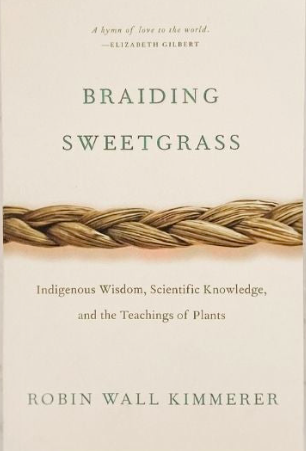Gindaasdaa (Reading Together) Book Club

Event Date:
Thursday, February 3, 2022 - 6:30pm EST
Thursday, February 10, 2022 - 6:30pm EST
Thursday, February 17, 2022 - 6:30pm EST
Thursday, February 24, 2022 - 6:30pm EST
Thursday, March 3, 2022 - 6:30pm EST
Thursday, March 10, 2022 - 6:30pm EST
Thursday, March 17, 2022 - 6:30pm EDT
Thursday, March 24, 2022 - 6:30pm EDT
Thursday, March 31, 2022 - 6:30pm EDT
Event Location:
via Zoom
Event Contact Name:
Mercedes Jacko (she/her)
Event Contact E-mail:
Gindaasdaa (Reading Together) Book Club
THURSDAYS ~ 6:30 pm to 7:30 pm
Beausoleil First Nation and Lakehead University Indigenous Initiatives have partnered on hosting a virtual book club.
The book we are reading together is Braiding Sweetgrass by Robin Wall Kimmerer.
This book club will allow space for folks to meet new friends, build relationships, and stay connected with others while sharing insight. One of the many reasons we chose this book is it's flexibility. Each chapter could stand alone allowing readers to join us at any time (or even take a break). The reading schedule is about 1-hour of reading a week and we meet Thursdays from 6:30 p.m. - 7:30 p.m. If you are interested in more information and/or joining us, please connect with Mercedes Jacko, Indigenous Initiatives Coordinator (Orillia) by email via orillia.ii@lakeheadu.ca
Open to both Orillia and Thunder Bay campuses.
 What is this book about?
What is this book about?As a botanist, Robin Wall Kimmerer has been trained to ask questions of nature with the tools of science. As a member of the Citizen Potawatomi Nation, she embraces the notion that plants and animals are our oldest teachers. In Braiding Sweetgrass, Kimmerer brings these two ways of knowledge together.
Drawing on her life as an indigenous scientist, a mother, and a woman, Kimmerer shows how other living beings - asters and goldenrod, strawberries and squash, salamanders, algae, and sweetgrass - offer us gifts and lessons, even if we've forgotten how to hear their voices. In a rich braid of reflections that range from the creation of Turtle Island to the forces that threaten its flourishing today, she circles toward a central argument: that the awakening of a wider ecological consciousness requires the acknowledgment and celebration of our reciprocal relationship with the rest of the living world. For only when we can hear the languages of other beings will we be capable of understanding the generosity of the earth, and learn to give our own gifts in return.
Drawing on her life as an indigenous scientist, a mother, and a woman, Kimmerer shows how other living beings - asters and goldenrod, strawberries and squash, salamanders, algae, and sweetgrass - offer us gifts and lessons, even if we've forgotten how to hear their voices. In a rich braid of reflections that range from the creation of Turtle Island to the forces that threaten its flourishing today, she circles toward a central argument: that the awakening of a wider ecological consciousness requires the acknowledgment and celebration of our reciprocal relationship with the rest of the living world. For only when we can hear the languages of other beings will we be capable of understanding the generosity of the earth, and learn to give our own gifts in return.

